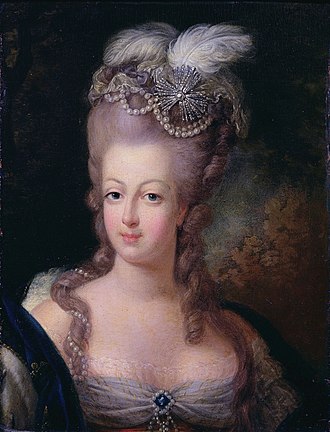It happened today - May 16, 2016
 You have to be careful quoting Lincoln, Einstein and other luminaries because they are “quotation magnets” to whom people unwittingly or unscrupulously attach things they feel that they should have said, especially online. But I’m not about to. Instead I’m going to quote something Marie Antoinette never said but should have.
You have to be careful quoting Lincoln, Einstein and other luminaries because they are “quotation magnets” to whom people unwittingly or unscrupulously attach things they feel that they should have said, especially online. But I’m not about to. Instead I’m going to quote something Marie Antoinette never said but should have.
Let them eat cake.
This phrase is a persistent mistranslation of “Qu’ils mangent les brioches.” And it’s funnier in a bitter way in the original, because brioches are a kind of egg-and-butter-rich pastry bun that one might conceivably make from flour if you had flour. Not even Ms. Antoinette, more properly Maria Antonia Josepha Johanna von Habsburg-Lothringen or Mrs. King Louis XVI, could have assumed French peasants routinely made cakes of the pink icing and little shepherdesses decoration sort.
It’s also a deliberate calumny to underline how out of touch she was. Or whoever you want to insult. Because it is important in the name of historical accuracy to emphasize that the line was pinned on all sorts of clueless aristocrats before being attached to her fancy frock. Or simple shepherdess dress. Or whatever elaborate costume she currently had on. It was an all purpose “down with the rich” insult that generally carried a venomous hope that, one day, “Qu’elle mange ses mots.”
The thing is, regrettably, the apocryphal line fit Marie Antoinette to a brioche. I feel some minor sympathy for her in that her situation in life made it easy to be clueless; as the 15th child of Holy Roman Emperor Francis I and the redoubtable Empress Maria Teresa of Austria, publicly married to the future Louis XVI at age 14 on May 16 1770, she was insulated from reality in a pampered way from the get-go. But even if cluelessness was made easy for her, Marie Antoinette seems to have plunged into the role with unseemly enthusiasm.
She schemed at court, she spent wildly, she spun elaborate self-flattering PR schemes. She even had a rustic retreat built within Versailles, L’Hameau de la Reine, where she could play at shepherdess at enormous cost to the real shepherds and subsistence farmers of France whom she despised from a great distance. When she did become more involved in affairs of state in her 20s, her efforts were counterproductive in frivolously disastrous ways.
She thus became enormously unpopular in ways that became self-reinforcing. Scandals and outrageous stories developed a habit of sticking to her. Including the infamous “Affair of the Diamond Neckless” involving an absurdly costly gift Louis XV had made for his mistress Madame du Barry, but he died of smallpox and she was banished before it could be finished, and the jewelers’ subsequent desperate efforts to get someone royal to purchase it created the sort of intrigues in which the insular, self-absorbed French court specialised and which Dumas could have exploited and in fact did.
Marie Antoinette was not only cleared of guilt in the affair in court, she seems to have been quite innocent in this particular matter. But she was as sticky as an undercooked brioche, and that’s her own fault.
Given what happened to the ancien régime and the French royal family including her, it’s a pity she didn’t really scornfully, vacantly, or vacantly scornfully utter that line since it became her epitaph anyway. But in fairness to her, she didn’t.